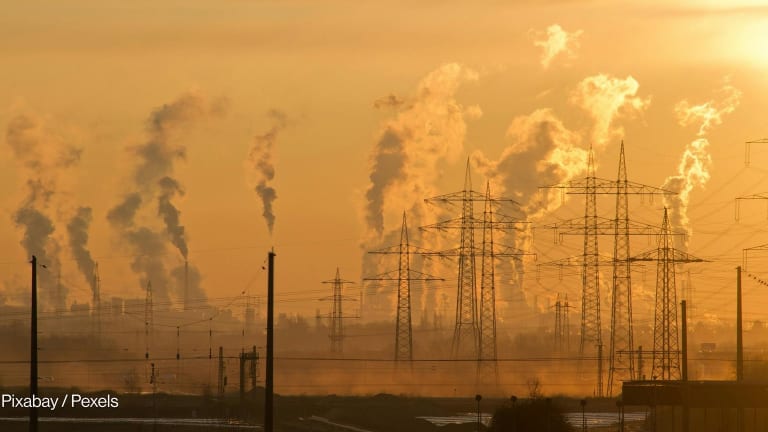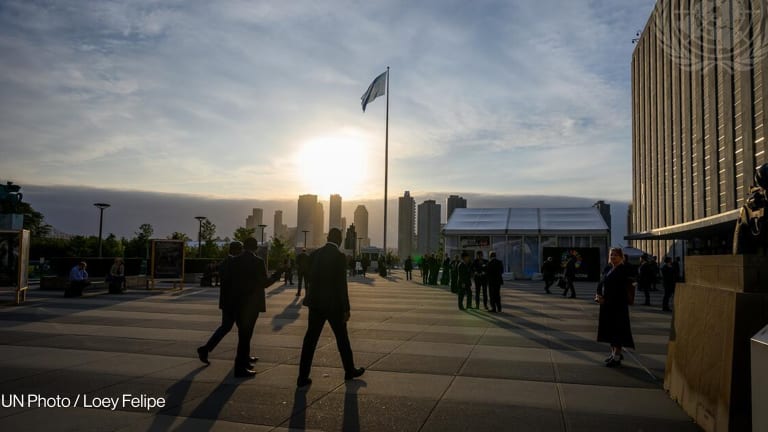
LONDON — Education advocates are celebrating after learning featured high on the agenda at last week’s United Nations General Assembly in New York, which saw the launch of a number of new commitments, partnerships, and funds.
International Finance Facility for Education musters growing support
Details emerged about the development of the fledgling IFFEd during the U.N. General Assembly.
“Education really came of age at this year’s UNGA,” said Joseph Nhan-O'Reilly, Save the Children’s head of education policy and advocacy, pointing to high-profile events and high-level engagement.
A “big highlight” was a session on Wednesday at which the Canadian, French, and British leaders, as well as ministers from Kenya, Niger, and Jordan, joined forces to pledge their commitment to girls’ education. “Having three G-7 leaders talking so passionately about education was a high-water mark and heartily welcomed by education advocates,” he said.
They were joined by representatives from the major global education institutions in signing a joint statement which committed to “provide opportunity for 12 years of free, safe, and quality education that promotes gender equality, builds literacy and numeracy skills, and skills for life and the jobs of the future.”
UNGA also saw the launch of new education partnerships including Generation Unlimited, or Gen-U, which aims to get all young people aged between 10-24 into some form of school, learning, training or employment by 2030.
It brings together governments, the private sector, academia, civil society organizations, and young people to “co-create, fund, and scale up innovative solutions to expand opportunities for the world’s young people,” according to a press release. Heavyweights including U.N. Secretary-General António Guterres, president of the World Bank Jim Yong Kim and President of Rwanda Paul Kagame were at the launch event on Monday.
Speaking at the event, Henrietta Fore, the U.N. Children’s Fund’s executive director, said: “We’re calling for cutting-edge solutions and new ideas … The next step is to gather public and private partners around these ... to develop concrete plans to grow the funding base necessary to reach more young people, in more communities and countries.”
New investments and commitments
Financing initiatives announced during UNGA include a $100 million partnership between the Islamic Development Bank’s philanthropic arm — the Islamic Solidarity Fund for Development — and the Qatar-based Education Above All Foundation. It offers concessional loans to Muslim-majority countries to help get out-of-school children into the classroom. Mali will be the first to benefit, set to receive $31 million in loans to part finance a $144 million program.
The long-awaited International Finance Facility for Education, or IFFEd, was also “launched” during a side session on Monday, although the facility is still in the design phase and will not become operational until next year, participants were told. A number of donor countries pledged their support for the facility, which aims to catalyze multilateral development banks’ lending to lower- and middle-income countries for education. The World Bank’s Jim Kim also revealed he was ready to start approaching credit rating agencies — a crucial next step in getting the facility up and running.
The Dutch government announced it had pledged €100 million ($116 million) to the Global Partnership for Education, the largest global education fund, bringing the fund’s total to $2.3 billion.
Denmark upped its commitments to Education Cannot Wait, a fund to support education for children living in conflict and crisis areas, by $46 million, making it the fund’s biggest single donor. The Netherlands, Norway, and the foundation Dubai Cares also made new funding pledges to ECW.
Meanwhile, United Kingdom international development secretary Penny Mordaunt announced £7.8 million ($10.18 million) in new funding to improve education data and analysis through the UNESCO Institute for Statistics and the Global Education Monitoring report. This will include helping to set up a new indicator to look at the proportion of all children not learning the minimum level.
Refugees and migrants
Educating refugee and migrant children was also high on the agenda and was discussed at the High-Level Meeting on Action for Refugee Education on Wednesday. By the end of 2017, 4 million refugee children were out of school, an increase of half a million on the previous year, according to a recent report by the U.N. Refugee Agency.
The event brought together refugee- and migrant-hosting states, donor governments, multilateral institutions, the private sector, and civil society to agree how to accelerate commitments made under the New York Declaration for Refugees and Migrants in 2016, including “to ensure all refugee children are receiving education within a few months of arrival and to prioritise budgetary provision to facilitate this, including support for host countries.”
Save the Children was one of the co-conveners of the event, which Nhan-O'Reilly said secured commitments to act from 29 organizations.
“Getting every refugee child and their host community peers into school is absolutely possible, it’s just a case of making it happen,” he said.
But the focus at UNGA was not just on new financing for education: The Education Commission also published a new report calling for greater and better investment in cross-border knowledge sharing, launched at a side event on Monday. It follows a recommendation in the commission’s 2016 Learning Generation paper about the need to develop a “global ‘ecosystem for education.” The new paper puts forward criteria to help funders and practitioners drive investment in knowledge sharing.
“Too often, investment time frames are too short or impact measurement requirements are too strict to allow for effective investment in knowledge sharing,” said Lane McBride from the Boston Consulting Group, one of the paper’s co-authors.
NCDs. Climate change. Financing. Read more of Devex's coverage from the 73rd U.N. General Assembly here.
Search for articles
Most Read
- 1
- 2
- 3
- 4
- 5








